- Home
- Simon Kernick
The Payback Page 3
The Payback Read online
Page 3
‘OK,’ I said, and got to my feet, knowing I was about to embark on a journey that would leave another stain on an already blood-splattered conscience.
But if I’d had the remotest clue about the terrible darkness I was about to head into, I would have caught the first plane home and taken my chances, even if it did mean spending the rest of my days in jail.
Two
Their faces were cold and defiant, even though she knew they must have been terrified. They were, after all, little more than kids – the oldest only just turned eighteen, the other two, seventeen apiece – and their guilt had already been confirmed twenty-four hours earlier by the foreman of the jury. According to the rules of the English legal system, there is only one sentence for murder: life imprisonment. It was now simply a matter of the judge announcing the minimum term each of them would serve, and everyone in the crowded courtroom knew that she was not going to be lenient. The circumstances of the crime were too extreme for that. Their victim, Michael Fremi, only sixteen years old, had been a promising student who should have been celebrating receiving nine GCSEs, five of them As or A stars. Sadly, Michael would never know what he’d achieved, because early one Friday evening the previous August, the three defendants, who’d been lying in wait at the end of his street, had ambushed him as he walked home from a friend’s house. Apparently, he’d stood up to one of them, Karl Brayer, the previous week when Brayer had tried to steal a friend’s mobile phone, forcing him to back down in the process, and this was his gang’s revenge. In a short but extremely violent attack, which witnesses later claimed had lasted barely seconds, they’d stabbed him a total of sixteen times, using three different knives. One of the blows had pierced his heart; another had severed his carotid artery. It was never really in any doubt that they’d meant to kill him.
DI Tina Boyd of Camden’s Murder Investigation Team, or CMIT as it was better known, had been on duty that night and was one of the first to the scene of the killing. One of the things she remembered most was Michael’s distraught mother cradling his dead body in her arms, unable to let him go. He’d had his eyes closed, a peaceful, almost angelic look on his young, unblemished face. And the blood. She couldn’t forget that either. There’d been so much of it that it had still been running into the gutter when she’d arrived.
They’d caught the killers quickly. They always did in cases like this, which always made Tina wonder why on earth these kids did it. Surely they realized that the end result – arrest, custody, conviction – was inevitable? Were their lives really that empty? Sadly, she knew the answer was yes, and as she stood there watching the defendants now, knowing that the guilty verdicts meant another good result for the team, she couldn’t feel much in the way of satisfaction.
Then the judge, a middle-aged woman with a naturally haughty face who looked frankly ridiculous in her wig and robes, began speaking and a stony hush fell over the courtroom.
Tina zoned out as the judge described the gratuitousness of the crime, and the sheer wickedness of the perpetrators. She’d heard it all before, and the words always sounded artificial, mainly because everything the judge said depended entirely on the jury’s verdict. If they’d decided it was self-defence, she would have now been apologizing to the three defendants and telling them they were free to go. One of Tina’s biggest gripes about the British legal system was that, however good the case she and her colleagues brought against the people they arrested, the outcome still rested on the whims of twelve members of the public who, far more often than not, had no prior knowledge of the law.
There was a loud cheer from behind Tina in the public gallery as Karl Brayer received his minimum term. He’d got seventeen years, making him thirty-five before he’d be considered for release, his youth by then no more than a fading memory. Brayer turned slowly and deliberately in the direction of the cheering and sneered with as much contempt as he could muster.
It was then that he caught Tina’s eye. It had been she who’d charged him with murder in the interview room, and seeing her now, he drew a forefinger slowly across his throat, mouthing the words ‘pig bitch’.
Tina smiled at him, putting just about the right amount of pity into her expression, feeling good about the world for the first time that day. It would take more than a jumped-up kid like Brayer to scare her, not after all that she’d been through over the years. ‘I could show you people who’d make your hair stand on end,’ she thought as she held his gaze, pleased that he was the first to turn away as the judge sentenced the other two defendants to sixteen years each.
And then it was over, and the security guards were manhandling the three of them away from the dock as they all struggled angrily, macho to the end, enduring a welter of abuse from one section of the public gallery, and cries of support from their families in the other.
Tina shook hands with two of her colleagues who’d come with her to watch the sentencing, then leaned back across the seats and hugged Constanta Fremi, Michael’s mother, who was weeping and smiling at the same time as the various emotions brought on by the tragedy she’d suffered got the better of her.
As soon as she was out on the street in front of the court building, Tina switched on her phone and lit a cigarette. She told the two colleagues – her new boss, DCI Bob Levine, and her sometime partner, DC Dan Grier – that she’d catch up with them back at the station. She had an appointment in Finchley with a witness to another street stabbing that had also ended in murder. The witness was a twenty-year-old single mother, Gemma Hanson, who was allegedly being intimidated by the families of those involved and was thinking of withdrawing her statement in advance of the April trial. Tina needed to shore up her resolve, because without her evidence their case against the suspect would almost certainly collapse. Witness intimidation was far more common than most people knew, and the police simply didn’t have the resources to protect everyone complaining of it. Realistically, all Tina could offer were encouraging words and the vague promise of extra police patrols in the neighbourhood. They’d already installed a panic button, but the last time Gemma had pressed it, after a brick had come sailing through her front window, narrowly missing the baby’s cot, the local uniforms had taken more than fifteen minutes to turn up. Tina knew her task was not going to be easy.
She sheltered in a shop doorway from the worst of the biting February wind and took a long, almost desperate drag on her cigarette, enjoying the harsh hit from the nicotine as it surged through her system. She only had one voicemail message, from a DS Rob Weale of Essex CID, asking her to call him when she had a moment. Although she didn’t recognize the name, she was intrigued enough to hit the call-back button.
He answered after three rings, announcing his name and rank in a strong Essex accent that was only half a degree away from ‘cor blimey’ cockney.
‘It’s Tina Boyd,’ she said, taking a last drag on her cigarette and stubbing it underfoot. ‘You called me.’
‘I did, yeah. Thanks for calling back. I understand you’ve been having some contact with a journalist by the name of Nick Penny. Is that right?’
Tina tensed. ‘He’s an acquaintance of mine, yes,’ she answered defensively.
‘Then I’ve got some bad news for you.’
She knew straight away what it was but she asked the question anyway, feeling a wrenching tightness in her gut. ‘What?’
‘He died last night. It looks like suicide.’
‘It isn’t,’ she said firmly. ‘It’s murder.’
DS Weale cleared his throat. ‘I had a feeling you might say that. I’m at the scene now. I think we need to talk.’
Three
For a number of years, Nick Penny had been a successful investigative reporter for the Guardian newspaper. He’d exposed the shady dealings of corporations and governments, leading to the resignations of a number of senior figures for corruption. Then, the summer before last, Tina had approached him with a tape recording she’d made of a senior politician directly incriminating a shadowy gangland
figure called Paul Wise in a plot to cover up a murder. Wise, a man with suspected links to drug smuggling, prostitution, terrorism and, most sickening of all, paedophilia, had long been Tina’s nemesis, and with this tape she’d seen an opportunity to bring him to justice.
The politician had been killed before he had a chance to repeat the allegations in court, and Tina had feared that if she gave the tape to the Crown Prosecution Service then it was possible it would disappear, given the number of friends Wise seemed to have within the establishment. Tina might not have agreed with his politics, but she trusted Penny completely, and he’d repaid her trust by getting the Guardian to print the transcript of the tape in full, even though it had been made illegally.
At first it had looked like Wise was finally going to be brought to justice. The British government had formally asked for his extradition, even though an extradition treaty didn’t exist with northern Cyprus. But Wise had not survived as long as he had by giving up easily, and using the financial resources at his disposal, he’d fought back hard. Appointing a team of top lawyers, he’d sued for libel the Guardian, Nick Penny himself and, most controversially, the estate of the government minister who’d made the allegations in the first place.
It was a clever move. Britain has some of the most draconian libel laws in the developed world, and within weeks the minister’s son had announced publicly that he didn’t believe the voice on the tape was that of his father. The writ against the estate for libel was dropped soon afterwards. Then a court in northern Cyprus had thrown out the British extradition case, citing lack of evidence. Finally, the British government began to backtrack as it became clear that the taped confession alone (even if it was proved genuine) wouldn’t be enough to convict Wise, and that there was nothing else connecting him to the plot, or any of the other criminal activities he was suspected of.
Penny had been sacked from the paper as its owners tried to distance themselves from the affair, and by the time Tina had returned from an extended holiday in central America the story had long since disappeared from the front pages. Wise had not only remained free, he was actually in a stronger position than he’d ever been, since there were now very few people willing to take him on.
It was just after one p.m., almost two hours after the phone call from DS Weale, when Tina parked her car outside the two-storey prefab unit in the far corner of a half-empty industrial estate where Nick Penny had kept his office. Since his sacking, it had been the base for what freelance journalism work he could get (which hadn’t been a great deal). It was also the place from where he was undertaking his unofficial investigation into Paul Wise’s activities, trying to find some chink in his armour – an investigation which Tina had been helping with, as much as she was able.
Penny had claimed that he couldn’t work properly in the idyllic little cottage a few miles away near Great Dunmow that he shared with his wife and two young children, because of the noise, but Tina had always thought he’d been mad setting up somewhere like this. It was an ugly, lonely place, and worse than that, it wasn’t safe for a man doing what he’d been doing, as had now been proved. There was no security at the gate, and the majority of the office lots were vacant – a hangover from the recession – so it wouldn’t have been difficult to take him out without any witnesses. She’d warned him about this but he’d told her he was being extremely careful. ‘And anyway,’ he’d said, in one of their last conversations, ‘it’d be way too risky taking me out. I’m too high profile.’
But now they had.
Tina was surprised to see that there was only a single squad car, as well as a possible unmarked, in the parking spaces outside. There was no scene-of-crime tape sealing off the premises, nor any signs of SOCO. Only a very cold-looking uniformed copper in a fluorescent jacket standing guard outside the front door. With Penny dead less than twenty-four hours, it could only mean that they weren’t treating the death as suspicious, and Tina felt an immediate flash of anger.
She showed the uniform on the door her warrant card and went up the narrow formica steps to the cramped first-floor room where she’d come only once before to see Penny. They’d met regularly over the past months, but whenever he’d thought he might have a lead worth talking about she’d always insisted they have their discussion in a place where it was less likely they’d be overheard. Penny had thought her paranoid – she knew that – particularly as none of the leads he was turning up were high quality, but Tina had had enough experience of their adversary to know that his ruthlessness and his desire to clear up loose ends could never be underestimated.
A young man in a suit and protective gloves – the only occupant of the room – stood up from the laptop he was examining and turned to greet her as she knocked on the door and stepped inside. He was tall and powerfully built, with short, cropped blond hair and a round, cheery face which had still not quite lost its puppy fat. Tina put him at about twenty-seven, though she reckoned he could probably pass for three or four years younger.
The man gave her a small, sympathetic smile and put out a hand. ‘DI Boyd, thanks for coming. I’m DS Rob Weale. Mr Penny’s wife told me that you’d met up with him a number of times recently.’
‘That’s right,’ Tina answered as they shook.
She slowly looked round the room. It was cluttered, as it had been the last time she’d been here. Files, newspapers and books were piled up on the windowsill, and much of the available floor space was taken up with unopened cardboard boxes. Nothing looked particularly out of place, except Penny’s chair, which had been moved out from behind the desk. Tina felt her jaw tighten as she scanned the contents of his desk: the photo of his two smiling girls; another one of his wife, Natalie; his stained West Ham United coffee mug sitting forlornly between the laptop and an overflowing Heineken ashtray. He’d been warned twice by the building’s owners not to smoke in the office but, like Tina, he liked to cock his nose at authority. She sighed. She’d liked Nick Penny.
There was no sign of his body now, and only the vague, almost imperceptible smell of decay in the frigid air, mixed with stale smoke, confirmed what had happened here.
‘Would you like to talk somewhere else, ma’am? I can imagine it’s not that easy for you doing it here.’
‘I’m fine,’ she answered, keen to get things moving. She forced herself to say the words: ‘How did he die?’
‘He hanged himself from there,’ answered Weale, motioning towards the steel girder that bisected the room a foot and a half above his head. ‘He stood on his chair. He’d swallowed a load of Bombay Sapphire before he did it. When he didn’t come home last night, and his wife couldn’t get hold of him, she called the police. A local patrol car found him when they came by here just before ten p.m. The bottle was by the chair, and the initial toxicology results show he was more than four times over the drink-drive limit when he died. We haven’t got an exact time of death, but the pathologist thinks it was between five and seven p.m.’
Tina put a hand on the desk as the full enormity of what had happened suddenly hit her. ‘Did he leave a note?’
‘He left three. One to his wife. One to his children. And one to someone he only addresses as T, and which he’s signed with a pet name, suggesting that it’s possibly a lover. Would you have any idea who that might be?’
Tina felt her jaw tighten as she met his gaze. ‘Yes,’ she said. ‘It’s me.’
Four
Keeping her demeanour as cool and professional as possible, even though she was churning up inside as different emotions – grief, embarrassment, and most of all guilt – swirled about her system, Tina asked if she could see the notes.
‘They’re definitely genuine,’ said Weale. ‘His wife recognizes the handwriting.’ He too looked embarrassed at Tina’s admission, having clearly not expected it. It made him look even younger somehow.
‘Did she see the one he wrote to me?’
‘No.’ Weale rubbed his head a little self-consciously. ‘We didn’t feel there was anything
to be gained at the moment by letting her know he was having an affair.’
Tina sighed, feeling relieved. ‘I know you don’t have to show me the letters, but I’d still appreciate it if I could take a look.’
Weale seemed to think about this for a moment, then nodded and produced three transparent evidence bags from a tattered leather briefcase propped on a box in the corner of the room. ‘I can’t let you touch them, I’m afraid, but you should be able to read them through the plastic.’
Each note was laid out flat inside the bag and he held them up one by one for her to read. They were all very short and apologetic, as he said sorry to those he was closest to for what he was about to do, and Weale was right, they’d definitely been written by Nick. She recognized his distinctive, very messy handwriting, as well as the doodle of a smiling face that he’d put at the end of the note to his daughters. He’d drawn a similar one on the birthday card he’d sent her a few months back. He’d also addressed her as ‘T’, the name he’d always called her by, and signed it ‘Mr P’, the name she’d sometimes used for him. It was also clear that Nick had made a real effort to make the words legible, which they just about were. No mean feat for him at the best of times. Damn near a miracle after he’d necked half a bottle of gin.
She swallowed hard, desperate not to look weak in front of DS Weale, and just about managing it.
‘Look, I’m not here to judge what happened between you two,’ said Weale, putting the bags back in the briefcase. ‘And I’m going to do everything I can to make sure it doesn’t get made public.’
‘Thanks.’
‘How long were you seeing him for?’
She sighed. ‘I worked with him on and off for about a year, and we’d been seeing each other for the last three months. But it finished two weeks ago.’
‘Who finished it? You or Mr Penny?’

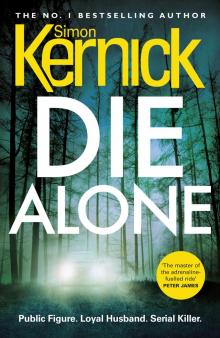 Die Alone
Die Alone Deadline
Deadline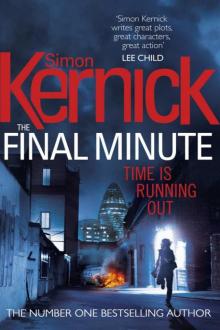 The Final Minute
The Final Minute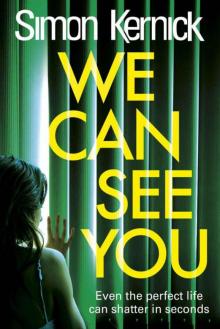 We Can See You
We Can See You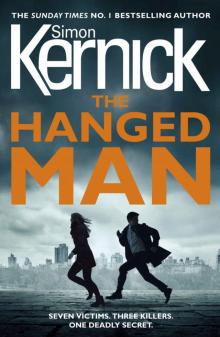 The Hanged Man (Bone Field 2)
The Hanged Man (Bone Field 2)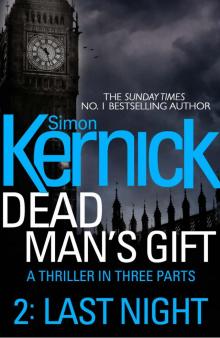 Dead Man's Gift 02 - Last Night
Dead Man's Gift 02 - Last Night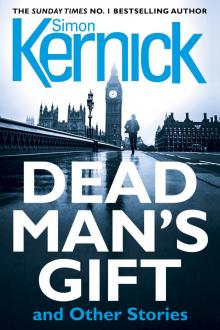 Dead Man's Gift and Other Stories
Dead Man's Gift and Other Stories A Good Day To Die
A Good Day To Die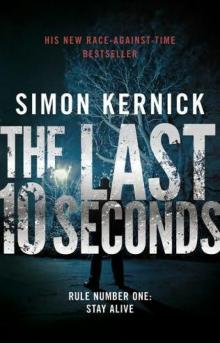 The Last 10 Seconds
The Last 10 Seconds The Murder Exchange
The Murder Exchange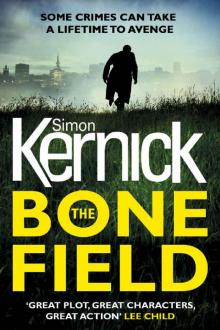 The Bone Field
The Bone Field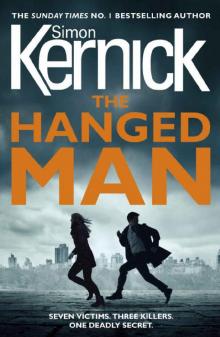 The Hanged Man
The Hanged Man Target
Target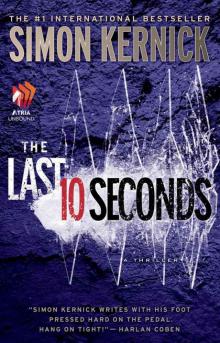 The Last 10 Seconds: A Novel
The Last 10 Seconds: A Novel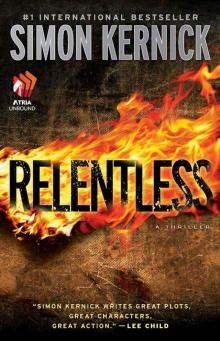 Relentless: A Novel
Relentless: A Novel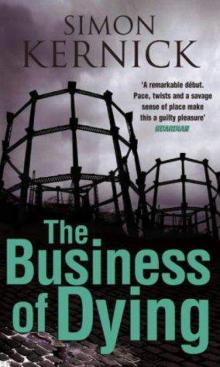 The Business Of Dying
The Business Of Dying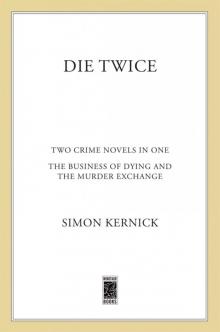 Die Twice
Die Twice Flytrap
Flytrap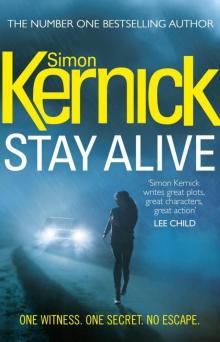 Stay Alive
Stay Alive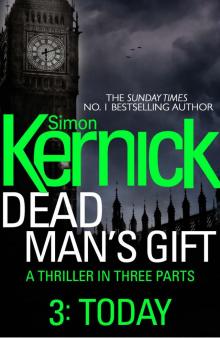 Dead Man's Gift 03 - Today
Dead Man's Gift 03 - Today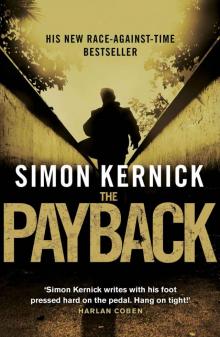 The Payback
The Payback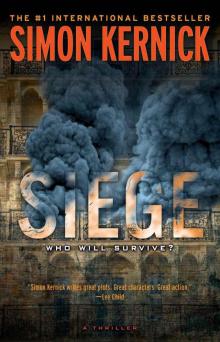 Siege: A Thriller
Siege: A Thriller The Crime Trade
The Crime Trade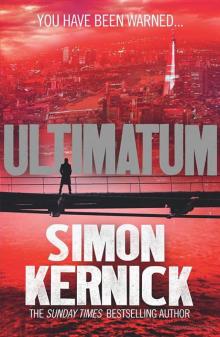 Ultimatum
Ultimatum